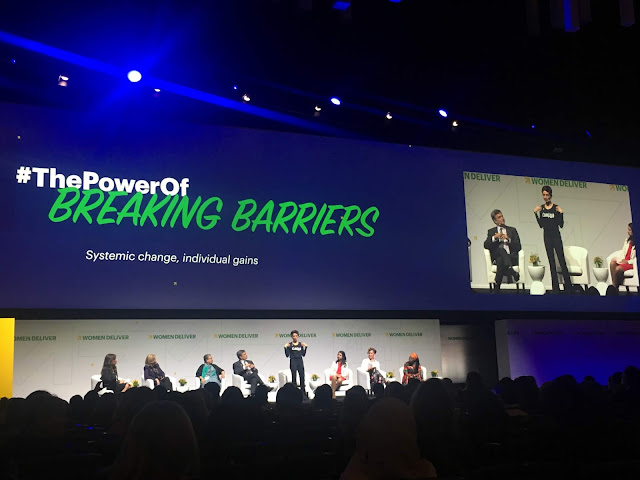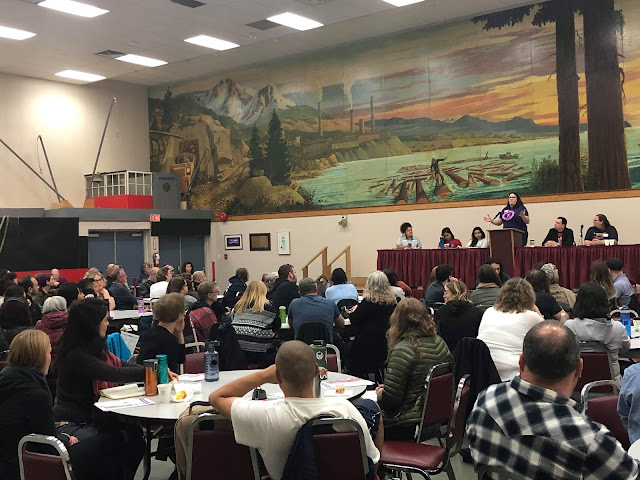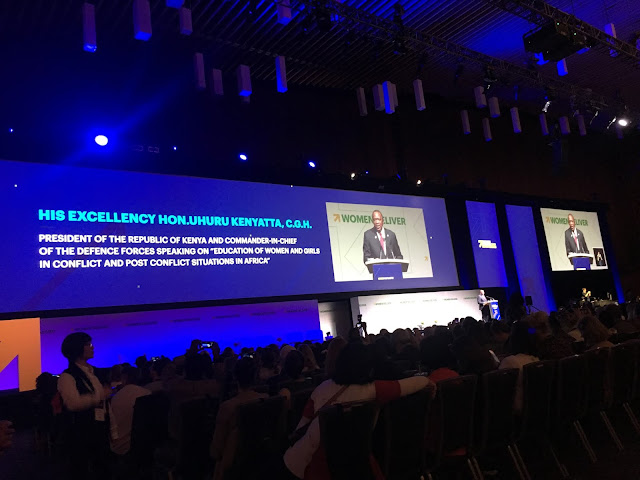Women Deliver: The Power of Breaking Barriers
The Power of Breaking Barriers: Systemic Change, Individual Gains
Dr. Natalia Kenem, the Executive Director of the UN Population Fund introduced and set the context for this panel. She said that women belong at the centre of development. Population isn't just about numbers it's about people's lives. As we take global stock of what's happening in the world, when everyone awakens, mountains will move.
And there is movement, and we'll hear from the following panelists on how we are moving toward progress and change.
Panel:
- Shahira Amin - Independent Journalist (moderator)
- Dr. Alvaro Bermejo - International Planned Parenthood
- Waneek Horn-Miller - Indigenous Olympian
- Hina Jilani - Supreme Court of Pakistan
- Musola Catherine Kaseketi - Vilole Images Productions
- Nancy Northrup - Centre for Reproductive Rights
- Lina Abirafeh, PhD - The Arab Institute for Women at the Lebanese American University
- Anoka Primrose - Social Entrepreneur
Nancy Northrup from the Centre for Reproductive Rights in Washington DC began talking about women's lack of access to health care and how in many countries, women aren't free to make choices about their bodies. Is it laws or culture? Both. Laws act as a barrier to access, like abortion restrictions (patriarchy in action). Denying women control over their lives shows a cultural idea of women not being able to make decisions (about anything).
When it comes to legislation there are so many levels to consider. Let's talk about abortion and take aim by illustrating how women are denied access. For example in Peru, a 17 year old is forced to carry a fetus to term that is not compatible with life. She lives in a country where sexual rights are taboo let alone abortion. In Alabama they have to contend with macho politics and a conservative group of politicians who want to reverse Roe v. Wade - but the constitution is strong and the CHANGE has a winning record of challenging the states re: reproductive rights.
 Hina Jilani is a lawyer at the Supreme Court of Pakistan. In Pakistan, culture is shaped by many factors and in turn shapes the law. Abortion is one of the most contentious issues in the country. Most of it is underground so it's hard to collect the data. Many barriers have been broken and she feels optimistic that change is possible. In 1992, came with Islamic penal rules. For example, a young mentally challenged girls was impregnated by her step father. They went to court, there was resistance from the judges and she explained to the judiciary that life does not mean preventing death, that we have to consider the quality of life. And the judges sided with her.
Hina Jilani is a lawyer at the Supreme Court of Pakistan. In Pakistan, culture is shaped by many factors and in turn shapes the law. Abortion is one of the most contentious issues in the country. Most of it is underground so it's hard to collect the data. Many barriers have been broken and she feels optimistic that change is possible. In 1992, came with Islamic penal rules. For example, a young mentally challenged girls was impregnated by her step father. They went to court, there was resistance from the judges and she explained to the judiciary that life does not mean preventing death, that we have to consider the quality of life. And the judges sided with her.
Governments need to have the courage to confront the anti groups to protect women and it needs to be unconditional in its support of women.
Dr. Alvaro Bermejo of the International Planned Parenthood Federation went into detail about the stigma for adolescent girls in making the right choice for their bodies. IPPF focuses on ensuring girls have access to family planning and that they feel that they matter, their sexuality matters. 2019, stigma, patriarchy and privilege has stymied girls acceptance of their own agency - we have to organize. The fear and hate are better organized and financed and more aggressive than ever.
Family planning needs to be a right. Education is important. You need to build on what these girls already know to improve confidence to get them to be activists. He talked about all of the women warriors at the conference. The First Lady of Namaibia gave a speech and at the end of it, a young woman with HIV felt included and talked about how there have been no condoms in northern Namibia since October 2018. SHAME! It's not that hard to supply condoms. That is all.
Lina Abirafeh, PhD - The Arab Institute for Women at the Lebanese American University was wearing a controversial shirt - one that spelled out FEMINIST in Arabic. Why controversial? Because it's a western word and concept and this particular shirt was meant to poke and provoke. In regards to stigma, we were not taught to have ownership of out bodies and if we can't talk about bodies then how can we talk about consent. In Arab culture children are not given permission to use the "no" which add another layer of complication to women's agency. There is also a misconception of what the limits of violence are in cultures - which goes back to body integrity. Intense.
Women's bodies and lives are determined by their religious sect in countries like Lebanon. We need to fight for universal secular rights. In the Arab region, population ins really young - though she feels that change on a large scale won't happen in her lifetime.
Anoka Primrose, Social Entrepreneur talked about the need for a supportive environment for women entrepreneurs. Women need access to funding and basic finances to start businesses -to have access to assets on their own. In many places their access is determined by their relationship to a man (whether a husband, father, brother - that determines whether or not a woman can access funding). That lack of access allows for domestic violence to occur, for the climate to deteriorate and human rights abuses. These things don't exist in isolation, they all intersect and we cannot forget it. For her agency is about wanting an education and to to own their own bodies.
When it comes to legislation there are so many levels to consider. Let's talk about abortion and take aim by illustrating how women are denied access. For example in Peru, a 17 year old is forced to carry a fetus to term that is not compatible with life. She lives in a country where sexual rights are taboo let alone abortion. In Alabama they have to contend with macho politics and a conservative group of politicians who want to reverse Roe v. Wade - but the constitution is strong and the CHANGE has a winning record of challenging the states re: reproductive rights.
 Hina Jilani is a lawyer at the Supreme Court of Pakistan. In Pakistan, culture is shaped by many factors and in turn shapes the law. Abortion is one of the most contentious issues in the country. Most of it is underground so it's hard to collect the data. Many barriers have been broken and she feels optimistic that change is possible. In 1992, came with Islamic penal rules. For example, a young mentally challenged girls was impregnated by her step father. They went to court, there was resistance from the judges and she explained to the judiciary that life does not mean preventing death, that we have to consider the quality of life. And the judges sided with her.
Hina Jilani is a lawyer at the Supreme Court of Pakistan. In Pakistan, culture is shaped by many factors and in turn shapes the law. Abortion is one of the most contentious issues in the country. Most of it is underground so it's hard to collect the data. Many barriers have been broken and she feels optimistic that change is possible. In 1992, came with Islamic penal rules. For example, a young mentally challenged girls was impregnated by her step father. They went to court, there was resistance from the judges and she explained to the judiciary that life does not mean preventing death, that we have to consider the quality of life. And the judges sided with her. Governments need to have the courage to confront the anti groups to protect women and it needs to be unconditional in its support of women.
Dr. Alvaro Bermejo of the International Planned Parenthood Federation went into detail about the stigma for adolescent girls in making the right choice for their bodies. IPPF focuses on ensuring girls have access to family planning and that they feel that they matter, their sexuality matters. 2019, stigma, patriarchy and privilege has stymied girls acceptance of their own agency - we have to organize. The fear and hate are better organized and financed and more aggressive than ever.
Family planning needs to be a right. Education is important. You need to build on what these girls already know to improve confidence to get them to be activists. He talked about all of the women warriors at the conference. The First Lady of Namaibia gave a speech and at the end of it, a young woman with HIV felt included and talked about how there have been no condoms in northern Namibia since October 2018. SHAME! It's not that hard to supply condoms. That is all.
Lina Abirafeh, PhD - The Arab Institute for Women at the Lebanese American University was wearing a controversial shirt - one that spelled out FEMINIST in Arabic. Why controversial? Because it's a western word and concept and this particular shirt was meant to poke and provoke. In regards to stigma, we were not taught to have ownership of out bodies and if we can't talk about bodies then how can we talk about consent. In Arab culture children are not given permission to use the "no" which add another layer of complication to women's agency. There is also a misconception of what the limits of violence are in cultures - which goes back to body integrity. Intense.
Women's bodies and lives are determined by their religious sect in countries like Lebanon. We need to fight for universal secular rights. In the Arab region, population ins really young - though she feels that change on a large scale won't happen in her lifetime.
Anoka Primrose, Social Entrepreneur talked about the need for a supportive environment for women entrepreneurs. Women need access to funding and basic finances to start businesses -to have access to assets on their own. In many places their access is determined by their relationship to a man (whether a husband, father, brother - that determines whether or not a woman can access funding). That lack of access allows for domestic violence to occur, for the climate to deteriorate and human rights abuses. These things don't exist in isolation, they all intersect and we cannot forget it. For her agency is about wanting an education and to to own their own bodies.
 I was really excited for our next speaker. Waneek Horn-Miller, an indigenous Olympian (water polo) from Canada. She used some of her time to talk about the national enquiry on murdered and missing indigenous women. She was honest and told us she doesn't speak on behalf of all indigenous people in Canada, that she speaks for herself and her children. The lack of justice and indifference has been traumatizing. Then she told her story and her experience as an athlete.
I was really excited for our next speaker. Waneek Horn-Miller, an indigenous Olympian (water polo) from Canada. She used some of her time to talk about the national enquiry on murdered and missing indigenous women. She was honest and told us she doesn't speak on behalf of all indigenous people in Canada, that she speaks for herself and her children. The lack of justice and indifference has been traumatizing. Then she told her story and her experience as an athlete.
She had to decolonize her own mind as stereotypes had been ingrained in her identity and values. As indigenous athletes in Canada there are many challenges. Obtaining access to facilities - you only have to look at Canada's Olympic teams to see they do not reflect Canadian society. She shared her triumph of getting to the Olympics - in spite of the system (influenced by the Indian Act). She is committed to bring justice and equity to get rid of abusive coaches and to create "safe spaces" in sport in Canada.
Next up was Musola Catherine Kaseketi of Vilole Images Productions talk to us about people with intellectual disabilities, often hidden away at home because parents are ashamed. In many African cultures, the stigma/myths/taboo of disabilities is entrenched in their cultures. That maybe there is something wrong with the parents and that witchcraft is involved. So what can we do? Change government policy, change the mindset of socialization and sensitization. Media plays a role. Art also plays a role - to lighten and provoke debate. If we are going to break barriers how do we change the mindset (girls don't exist in policies in her country so how do we give them the agency to speak up). She will continue to tell those stories to be a voice for the voiceless. To empower PWD with strategies so that they themselves can tell their stories to promote inclusion OVER integration.
Another great panel but the session isn't over yet - our closing speaker is none other than Ziauddin Yousafzai of the Malala Foundation, Malala's dad! WOW! And he introduced himself that way "once upon a time she was my daughter and now I am her father." Ziauddin told us his origin story about growing up with five sisters and one brother in northwest Pakistan in a typical patriarchal family. He saw firsthand the difference between how he was treated in the family compared to his sisters. You didn't have to look farther than the dinner table to see which parts of the chicken were offered to the sons and which parts were offered to the daughters. He and his brother had nicer and newer clothes than his sisters and his parents had big dreams for their sons and then married their daughters off as soon as possible. While he was pursuing his dreams, his sisters stayed home and didn't dream beyond becoming wives and mothers. The absence of women's identity in his culture is something he wants to change.
For him, education made him aware of the gender injustices and inequalities in his family and society at large. He then made tribute to his wife, as his "treasure of wisdom," always seeking her advice and counsel. They wanted to ensure that they had an egalitarian family and are extremely proud of their daughter Malala and also their 2 sons who believe in gender equality.
Quality education is the most powerful equalizer, a magic wand and recognizes that his sisters would have had entirely different lives if they were allowed to attend school. The Taliban banned girls education and the Yousafzai's encouraged Malala to speak out, write blogs and speak to media about the importance of educating girls. He said that Malala, one girl was more powerful than the guns of the Taliban. The Taliban thought that Malala's voice was a threat to their survival (which it was/is).
If we educate all girls we add trillions of dollars to the world's economy which in turns positively impacts:
- peace
- equality
- democracy
- wealth
- climate change
Men need to deflect patriarchal thinking in their minds. They need to have feminist families, companies and governments to make gender equality a reality and that leads to happiness and prosperity (he knows from experience). The world cannot succeed if half of the population is held back! Let's not rip the wings off women, let's all fly and flourish together!





Comments
Post a Comment